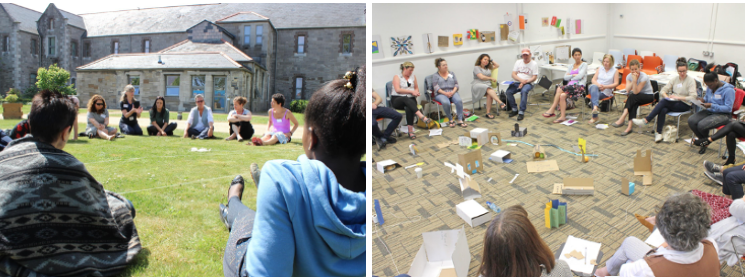When: July 2018
Where: Dublin, Ireland
Institution: Technology University Dublin (TUD)
Facilitator: Doris Sommer
The Pre-Texts: Training of Trainers workshop took place in July 2018. It was hosted by Technology University Dublin (TUD) in their newly emerging campus in the inner city of Dublin. The workshop was preceded by a public talk given by Prof. Doris Sommer, hosted by the Dublin School of the Creative Arts.
The Training of Trainers was completed by twenty-three participants over three days comprising fifteen hours over five sessions. The complex text chosen for this workshop was an excerpt from Michael Foucault’s Discipline and Punish (1975), Panopticism III (Vintage Books 1995), pp. 195-228, translated from the French by Alan Sheridan. This text resonated with the environment in which the workshop took place which was a Psychiatric Hospital and Women’s Jail that was being redeveloped into Ireland’s first technological university.

Report on Pre-Texts: Training of Trainers workshop in Dublin, Ireland by Emma O’Brien:
Technology University Dublin (TU Dublin) hosted the first Pre-Texts: Training of Trainers workshop on its campus in July 2018.
An open call was made to teachers, trainers, youth workers, artists, educators and others working in learning environments with children, young people or adults in Dublin’s inner city to join the Train the Trainer workshops. Following a positive response, the training began when Dr. Sommer facilitated a two-and-a-half-day intensive workshop at the TU Dublin campus, Grangegorman. Twenty-three participants from diverse backgrounds across Dublin City joined the Pre-Texts training.
Arriving on the first day, no one could have imagined the special bond that would bring the community of learners together. Over the following days, participants enjoyed ‘playing’ Pre-Texts, working with the challenging text “Panopticism” from French philosopher Michel Foucault’s 1975 book Discipline and Punish: The Birth of the Prison. This text choice was deemed appropriate given the history of incarceration associated with the Grangegorman site.
The first session began with ice-breakers encouraging the group to get to know each other in an inclusive way, followed by a reading of the text out loud as participants designed book covers while listening. After the book covers were developed (in the style of cartoneras, a Latin American publishing tradition of using recycled cardboard to make beautiful book covers), everyone asked a question of the text. Choosing a piece of writing from recycled literature such as magazines and newspapers, participants used clothespins to hang their pieces on a clothesline. “Publishing online”’ in this innovative, literal way is a central aspect of Pre-Texts.
Moving the clothesline outdoors to enjoy the beautiful sunny Dublin weather, the group read and discussed each published piece, making the texts become more meaningful one-by-one. These “tangents” are a core element of Pre-Texts that invite participants to connect an external text to the original text. Doing this also highlighted that the activities of Pre-Texts are not constrained to a typical classroom environment. Another key Pre-Texts moment, asking “What did we do?” upon concluding every activity, requires participants to share their reflections on that process.
The democratizing effect of collective reflection was identified as a key transformative moment in which everyone was encouraged to look at each other, not just at the facilitator, ensuring that everyone had an opportunity to contribute, listening to each voice until everyone had spoken. This initially challenged the Dublin group, however, as the workshop progressed these moments became deeper and more reflective, encapsulating the participants’ transformative learning journey.
Participants were then encouraged to form groups and create a learning activity linked to the text for their peers. What followed was an amazing array of over twenty innovative and creative learning modules that brought “Panopticism” to life through poetry, photography, word activities, drama, theatre, mime, collective story writing, editorial work and sculpture making. All were delivered and received enthusiastically by participants. In one session, the artist educators developed a learning activity based on architectural/urban planning. The facilitators laid down a physical boundary of the town wall, as described in the text. Participants created a model of a building mentioned in the text. As each group member added their model, the town from the text emerged in physical form, leading to a stimulating debate regarding contemporary urban planning and spatial politics.
Towards the end of the Train the Trainer workshop, participants shared personalized lesson plans to implement Pre-Texts in their own community. Acknowledging Dublin’s rich literary heritage, many considered using texts from acclaimed Dublin authors such as James Joyce to introduce Pre-Texts in their communities. Two “weavers” were chosen from within the group to support participants in introducing Pre-Texts in their own communities and aid the development of a community of practice.